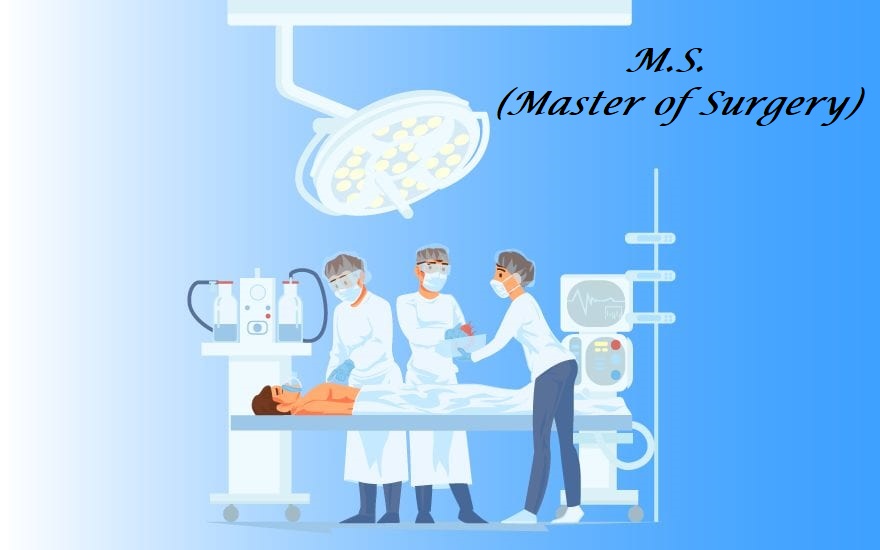MS
The Master of Surgery (MS) is a postgraduate degree focused on surgical specialties. It provides advanced training in surgical procedures and techniques, preparing graduates for careers as specialized surgeons. Here's an overview of the MS course, including its duration and eligibility criteria:
Course Overview
Duration:
- The MS course typically lasts 3 years for candidates who have completed their MBBS degree. For those who have completed a diploma in a particular surgical specialty, the MS course may be 2 years in some institutions.
Eligibility
Educational Requirements:
- Candidates must have completed an MBBS degree from a recognized medical college or university.
- They should have completed a one-year compulsory rotating internship.
- They must be registered with the Medical Council of India (MCI) or the respective state medical council.
Entrance Examinations:
Admission to MS programs is generally based on performance in national or state-level entrance examinations such as:
- NEET-PG (National Eligibility cum Entrance Test - Postgraduate): Conducted by the National Board of Examinations (NBE), NEET-PG is the primary entrance examination for MS courses in India.
- AIIMS PG: Conducted by the All India Institute of Medical Sciences for admission to its own postgraduate courses.
- JIPMER PG: Conducted by Jawaharlal Institute of Postgraduate Medical Education & Research.
- State-level Entrance Exams: Some states have their own entrance exams for admission to state medical colleges.
Specializations
MS courses offer various specializations, including but not limited to:
- General Surgery
- Orthopedics
- Ophthalmology
- Obstetrics and Gynecology
- Otorhinolaryngology (ENT)
- Neurosurgery
- Cardiothoracic Surgery
- Plastic Surgery
- Pediatric Surgery
- Urology
Career Opportunities
After completing an MS degree, graduates have several career options, including:
Clinical Practice:
- Specialist surgeon in hospitals and surgical centers.
- Consultant in private practice or specialty clinics.
- Positions in government hospitals and healthcare institutions.
Further Studies and Fellowships:
- Super-specialization (MCh or DNB) in fields such as Cardiac Surgery, Neurosurgery, Urology, etc.
- Fellowships in specific surgical specialties to gain advanced skills and experience.
Teaching and Research:
- Academic positions as lecturers, assistant professors, or professors in medical colleges.
- Research roles in medical research institutions and universities.
Healthcare Administration:
- Administrative and leadership roles in hospitals and healthcare organizations.
- Positions in health policy and planning in governmental and non-governmental organizations.
Corporate Sector:
- Roles in pharmaceutical companies, medical device companies, and health insurance companies.
- Medical consultancy and advisory positions in healthcare IT and management firms.
Summary
The MS course is designed to provide comprehensive training and expertise in surgical fields. Admission involves competitive entrance exams like NEET-PG to ensure only qualified candidates pursue this advanced medical education. Post-graduation, MS degree holders have diverse career opportunities in clinical practice, academia, research, and healthcare administration, making it a prestigious and rewarding career path for those committed to surgical excellence.

